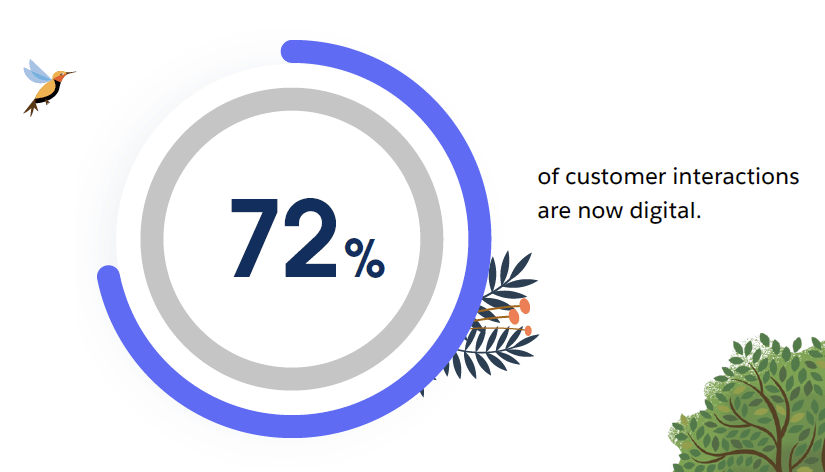I can’t imagine a CIO presenting to their board of directors a 2024 digital transformation roadmap that doesn’t have AI on the list of priorities. Yes, there’s plenty of hype and generative AI (GenAI) squirrel chasing, but I have curated some very real, tangible business impacts.
Take Salesforce, which has significant AI capabilities but chose to partner to achieve a +90% self-service customer success rate, using AI search in nine different use cases. Another example is how Dell deployed AI search to their workforce and saw employee satisfaction scores (ESAT) climb from 23% to over 60% in a single quarter.
Big tech companies are partnering with an AI search platform to improve both employee and customer experiences. They seek to bring generative AI (GenAI), natural language processing, and other unstructured data capabilities to their organizations faster. Their approach leverages a mix of out-of-the-box integrations, low-code development options, and API capabilities to deploy personalized experiences.
In my discussions with CIOs and when presenting keynotes and webinars, I recommend seeking digital transformation force multipliers where one investment yields multiple business impacts. Examples include platforms that yield revenue and cost benefits, improve customer and employee experiences, and support innovation while enabling M&A integrations.
So where should you start? Below are three areas where one intelligent search platform is a conduit for executing three key AI investments that can yield short-term business benefits.
Reshape the Customer Experience with GenAI
When the web went mainstream, it was a radical shift in how companies in retail, media, and other industries interfaced with customers. Mobile and web 2.0 introduced a second generation of capabilities that impacted most B2C and B2B companies. I believe GenAI and large language models are the next wave and will energize the consumerization of natural language search.
Customers will want to ask a question instead of being frustrated by lackluster keyword search results. They must find chatbots easier to use and show intelligence beyond what rule-based methodologies support. Companies must broaden their search platforms to include more data and develop personalized experiences, especially to increase lead conversion and improve customer loyalty.

I expect these five AI search capabilities to go from emerging to mainstream over the next year because ChatGPT will raise customer expectations.
The bottom line is that most customer-facing interfaces will need upgrades, and some will require overhauls. A good place to start is to audit the number of customer-facing user interfaces, search engine technologies, and primary data sources that operate in silos. While re-platforming and consolidating the user interfaces is not trivial, centralizing the search experience can be implemented incrementally. Look for AI search platforms that simplify integrations and enable headless search as tools to accelerate implementation.
Reinvigorate Customer Support with 360-Degree Customer Views
Who is more frustrated? The customer reaching out to customer support for help, the agent trying to review all the customer’s relevant information to address their issues, or the customer support leader reviewing low customer satisfaction scores?
First-generation CRM and customer support systems provided workflow for agents and reports for managers but provided relatively little intelligence to resolve issues or answer questions efficiently. CRM vendors suggested loading more data to support case management, but CIOs were left holding the bag with the complexities and costs of using these customer support workflow tools as search platforms. And whatever customer-relevant content didn’t get intelligently integrated was left behind for agents to swivel chair to other platforms to search for answers while customers were left waiting.
CIOs seeking executive partners for AI search investments can find customer service and support leaders as key collaborators. CIOs can help transform customer support from a cost to a revenue center by providing added intelligence to agents and enabling them to offer customers upsells and suggest new services.
Lead a Future of Work that Energizes Employees
The investment in AI search to improve customer experiences and customer support are stepping stones to what’s arguably the most important investment for CIOs: Guiding employees to a future of work enabled by generative AI and empowering them with self-service technology capabilities.
In one survey, 49% of employees fear AI will steal their jobs, and 74% of American adults fear unemployment from AI and automation. It’s hard to drive employee engagement and gain support for digital transformation programs when employees fear that participation undermines their long-term financial well-being.
CIOs have the unique opportunity to provide the next-gen AI tools to support employee creativity and innovation. Here are some examples of where CIOs win:
- Provide subject matter experts with low-code search tools and empower them to expand the enterprise knowledge base while reducing institutional knowledge.
- Enable data scientists to tap into documents and unstructured data sources to enhance machine learning models and build smarter decision-making dashboards.
- Establish a search center of excellence so that technologists concerned about the impact of code generators can apply their technical skills to more important opportunities and technically challenging disciplines.
Every industry and job function has opportunities. I look forward to hospitals improving the patient experience by helping doctors and nurses use natural language queries when reviewing patient records. Education institutions can provide better tools for teachers and students to ask broader questions while collaborating on student projects. Banks and financial institutions can improve their fraud detection by including more unstructured data sources in their algorithms.
One AI search platform and three key AI investments can launch many businesses into the generative AI era.
Dig Deeper
Think search isn’t at the core of a total experience? Learn from 600+ tech professionals on their enterprise architecture and digital transformation viewpoints (and why search is crucial).


